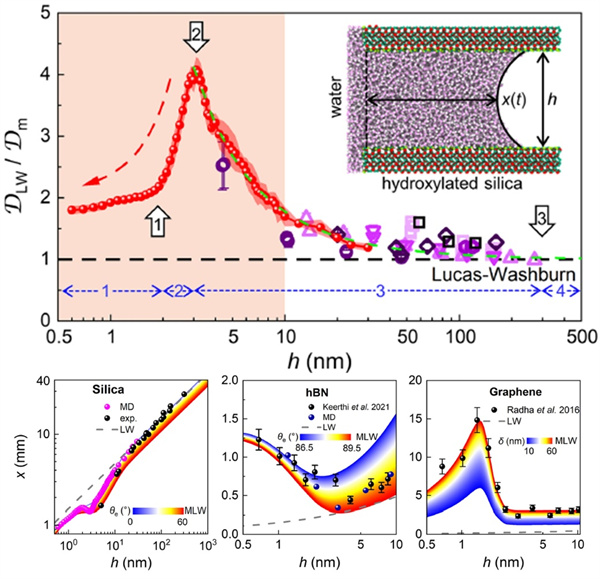XJTU researchers unveil mystery of water flow at nanoscale

Non-monotonic variation of capillary flow of water at the nanoscale and comparison of flow theoretical models.
The spontaneous capillary flow phenomenon of water confined in nanoscale spaces is widely present in various industrial processes related to energy development, conversion, and utilization, such as tight oil and gas extraction, nanoporous membrane separation, and solar-assisted water evaporation. Fundamental theoretical research on this flow process can help improve quality and efficiency and promote energy conservation and emissions reduction in these processes.
However, due to nanoscale effects such as surface effects and small size effects, water confined in nanoscale spaces is entirely different from bulk water at the macroscopic scale, and classical fluid mechanics theories are no longer applicable. Therefore, an important academic challenge is to achieve a theoretical description of the flow process of water confined in nanoscale spaces by fully considering these nanoscale effects.
Due to limitations in experimental techniques, direct experimental research on nanoscale capillary flow is currently limited to 10 nm. By utilizing high-precision, large-scale molecular simulations, a team led by Professors Bai Bofeng and Sun Chengzhen at the State Key Laboratory of Multiphase Flow in Power Engineering at Xi'an Jiaotong University (XJTU) studied the capillary flow characteristics of water in nanochannels with characteristic scales ranging from sub-nanometer to 30 nm.
Their study comprehensively revealed the scale dependence of capillary flow, challenging the common perception that smaller channels lead to greater resistance and slower flow. The developed capillary flow model provides a unified insight into nanofluidics, marking a significant step forward in this field. It lays a solid theoretical foundation for the further refinement of the theoretical framework of fluid flow characteristics in confined nanoscale spaces and for the development and upgrading of technologies such as membrane separation and energy conversion based on rapid transport and precise control of water molecules at the nanoscale.
Peer reviewers have praised the study, stating: "Its results are compelling as they offer a unified theoretical framework for the spontaneous imbibition of nanochannels," and "These results are of great importance for understanding and predicting nanofluidic flows."
The findings were recently published in the prestigious international physics journal Physical Review Letters under the title "Interlink between Abnormal Water Imbibition in Hydrophilic and Rapid Flow in Hydrophobic Nanochannels". The State Key Laboratory of Multiphase Flow in Power Engineering is the sole corresponding institution of the paper and Professor Sun is the sole corresponding author.

